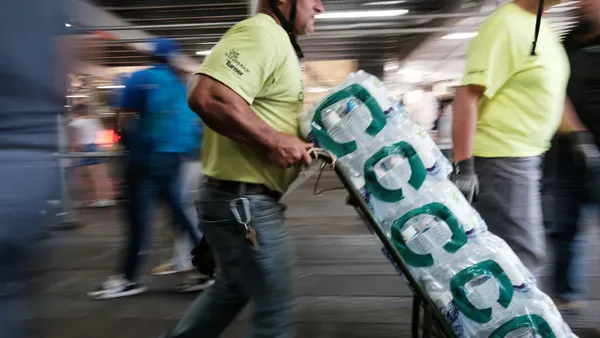Dive Brief:
- A group of 14 sexual assault survivors filed suit against Lyft last week in a California Superior Court alleging that the ride-sharing service failed to conduct adequate background checks of its drivers and implement proper investigation of sexual assault incidents reported by passengers.
- The suit alleges that Lyft does not have a zero tolerance policy for sexual misconduct and has allowed drivers reported for committing rape and sexual assault to continue driving. The suit also alleged numerous issues with the company's background check procedures, saying the company uses name-based checks as opposed to fingerprint-based checks, and that it has not implemented a way to monitor rides.
- "What the victims describe is terrifying and has no place in the Lyft community," Mary Winfield, head of trust and safety at Lyft, said in a statement emailed to HR Dive. Lyft further defended its position on background checks in a statement to HR Dive, saying that regulatory agencies in Maryland and California have endorsed its background check process.
Dive Insight:
The lawsuit deals partly with the issue of control over independent contractors in the gig economy, though many of the solutions proposed by plaintiffs in the suit wouldn't lead Lyft to blur the legal line between independent contractor and employee, Mark Spring, office managing partner at Carothers, DiSante and Freudenberger, and chair of the firm's traditional labor law practice group, told HR Dive in an interview. "A lot of the things being asked to be done, I don't think are major indicators of control," he said.
Lyft wouldn't be doing much more in the way of control by adding onto background checks, Spring said. And as far as updates to its app, the company announced Tuesday that it would roll out a feature later this year that will send users notices checking on them during and after a ride and asking if they need support. In May, it added a "panic button" within its app that allows riders to call 911.
As far as requiring drivers to add recording equipment, Spring explained that such a policy may affect control depending on how the equipment is paid for. "If Lyft is requiring drivers to pay for it, that's an indication of independent contractor status," he said
While employers with independent contractors who are drivers generally do not want to involve themselves in the day-to-day operational details of contractors' work, such employers are still potentially liable for the negligent selection of a driver, Jesse Jauregui, partner at Alston and Bird, told HR Dive in an emailed statement. Employers who hire true independent contractors generally aren't liable for the negligent acts of contractors, he noted, but "there are significant exceptions to that rule."
"The issue may become whether a jury determines that the hiring entity did not take the care which a prudent business would take in selecting the driver for the work, for example that more complete or extensive background checks were reasonable under the circumstances," Jauregui said.
The lawsuit is also impacting Lyft at a time of regulatory tension for the ride-sharing industry, thanks to California lawmakers' passage of Assembly Bill No. 5, which may force companies like Lyft to reclassify their platform users as employees. Lyft is part of a group of companies that spent millions of dollars opposing the bill.













